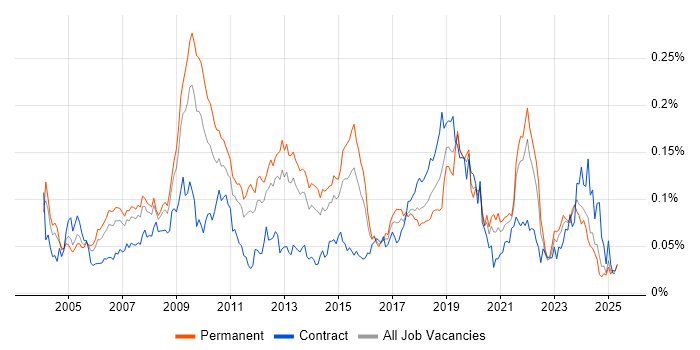Distributed Applications
UK > UK excluding London
The table below looks at the prevalence of the term Distributed Applications in permanent job vacancies in the UK excluding London. Included is a benchmarking guide to the salaries offered in vacancies that cited Distributed Applications over the 6 months leading up to 6 January 2026, comparing them to the same period in the previous two years.
| 6 months to 6 Jan 2026 |
Same period 2025 | Same period 2024 | |
|---|---|---|---|
| Rank | 524 | 557 | 520 |
| Rank change year-on-year | +33 | -37 | +234 |
| Permanent jobs citing Distributed Applications | 1 | 6 | 29 |
| As % of all permanent jobs in the UK excluding London | 0.002% | 0.016% | 0.090% |
| As % of the Miscellaneous category | 0.007% | 0.048% | 0.26% |
| Number of salaries quoted | 1 | 5 | 20 |
| 10th Percentile | - | £60,450 | £45,000 |
| 25th Percentile | £41,925 | £70,500 | £46,250 |
| Median annual salary (50th Percentile) | £42,750 | £94,637 | £75,000 |
| Median % change year-on-year | -54.83% | +26.18% | +7.14% |
| 75th Percentile | £43,575 | £107,500 | £96,539 |
| 90th Percentile | - | £127,406 | £117,236 |
| UK median annual salary | £91,375 | £80,000 | £77,500 |
| % change year-on-year | +14.22% | +3.23% | +6.90% |
All Generic Skills
UK excluding London
Distributed Applications falls under the General and Transferable Skills category. For comparison with the information above, the following table provides summary statistics for all permanent job vacancies requiring generic IT skills in the UK excluding London.
| Permanent vacancies with a requirement for generic IT skills | 13,692 | 12,468 | 11,358 |
| As % of all permanent jobs advertised in the UK excluding London | 32.53% | 34.13% | 35.14% |
| Number of salaries quoted | 6,314 | 5,420 | 8,068 |
| 10th Percentile | £26,375 | £30,000 | £29,510 |
| 25th Percentile | £31,500 | £41,250 | £38,852 |
| Median annual salary (50th Percentile) | £47,500 | £54,000 | £54,500 |
| Median % change year-on-year | -12.04% | -0.92% | -0.91% |
| 75th Percentile | £65,000 | £68,152 | £67,500 |
| 90th Percentile | £78,750 | £82,500 | £83,750 |
| UK median annual salary | £55,000 | £60,000 | £60,000 |
| % change year-on-year | -8.33% | - | -7.69% |
Distributed Applications
Job Vacancy Trend in the UK excluding London
Historical trend showing the proportion of permanent IT job postings citing Distributed Applications relative to all permanent IT jobs advertised in the UK excluding London.

Distributed Applications
Salary Trend in the UK excluding London
Salary distribution trend for jobs in the UK excluding London citing Distributed Applications.

Distributed Applications
Job Locations in the UK excluding London
The table below looks at the demand and provides a guide to the median salaries quoted in IT jobs citing Distributed Applications within the UK excluding London region over the 6 months to 6 January 2026. The 'Rank Change' column provides an indication of the change in demand within each location based on the same 6 month period last year.
| Location | Rank Change on Same Period Last Year |
Matching Permanent IT Job Ads |
Median Salary Past 6 Months |
Median Salary % Change on Same Period Last Year |
Live Jobs |
|---|---|---|---|---|---|
| South West | +8 | 1 | £42,750 | -60.67% | |
| Distributed Applications UK |
|||||
Distributed Applications
Co-Occurring Skills & Capabilities in the UK excluding London by Category
The following tables expand on the one above by listing co-occurrences grouped by category. They cover the same employment type, locality and period, with up to 20 co-occurrences shown in each category:
|
|
|||||||||||||||||||||||||||||||||||||||
|
|
|||||||||||||||||||||||||||||||||||||||
|
|
|||||||||||||||||||||||||||||||||||||||
|
|
|||||||||||||||||||||||||||||||||||||||
